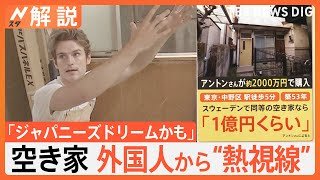TOKYO, June 11 (News On Japan) – Foreigners have shown significant interest in Japan’s vacant houses, commonly known as ‘akiya’, due to the aging population and rural depopulation problems. But what kind of vacant homes attract these buyers?
Foreigners attracted to vacant houses: “Everything I was looking for”
According to Aimi Yoshihara, the nationwide vacancy rate in 2023 was 13.8%, a slight increase from 2018. The highest rates were found in Wakayama and Tokushima prefectures at 21.2%, while Tokyo saw an increase to 11.0%.
In this context, vacant houses have become popular among foreigners. Miles from the US bought a 56-year-old building in Aso City, Kumamoto Prefecture, as his new home. He noted, “Everything I was looking for was there.”
Aso City welcomes foreign residents and provides resources such as multilingual waste management guides.
Takahiro Inoue, a news anchor, noted, “It’s encouraging to see foreigners who appreciate old houses and want to live here.”
Midwife Mihyon Song added, “It’s great when people with knowledge of traditional Japanese architecture, such as tokonoma and engawa, choose these houses.”
Bought a 53-year-old building in Nakano district for ¥20 million: “Old means cheap is a strange concept”
Anton from Sweden bought a 53-year-old house in Tokyo’s Nakano district, just a five-minute walk from the station, for about 20 million yen. He said: ‘It’s cheap compared to other countries.’
Anton explained that in Sweden old houses do not depreciate in value. ‘In good areas, houses that are 200 to 300 years old are common. The idea that ‘old means cheap’ is strange.’
He sees the value in mixing old and new elements and says, “The advantage of Akiya is combining the old with the new.” Anton plans to turn his renovated building into a guesthouse.
Chiaki Horan, another news anchor, commented, “Watching Anton’s renovation on YouTube was fascinating; his DIY skills go beyond those of an amateur.”
Inoue added: “Those with skills can find inspiration in the history and unique character of old properties.”
Weak yen fuels Akiya boom: properties equivalent to 100 million yen in Sweden
Yoshihara commented, “This could be called an unprecedented akiya tree.”
According to Jiv, which supports the purchase of foreign properties, “the weak yen compared to three to four years ago makes now the time to buy.”
A seminar for foreign investors in April 2024 attracted more than 80 participants. Anton said the 20 million yen house he bought in the Nakano district would cost about 100 million yen in Sweden. He called it ‘the Japanese dream’ because he could not afford a house in his own country.
Song noted that houses in countries with fewer earthquakes retain their value for centuries, but Japan’s seismic standards vary by era. Strengthening earthquake resistance through renovation is essential.
Inoue said some buyers are owning properties without living in them or renting them in anticipation of rising prices. Without regulation, this could leave Japanese unable to buy homes as prices rise due to foreign investment.
Song added, “It’s sad when cities remain abandoned.”
Horan concluded: ‘Matchmaking between buyers and vacant properties can improve safety and revitalize these areas.’
Source: TBS



